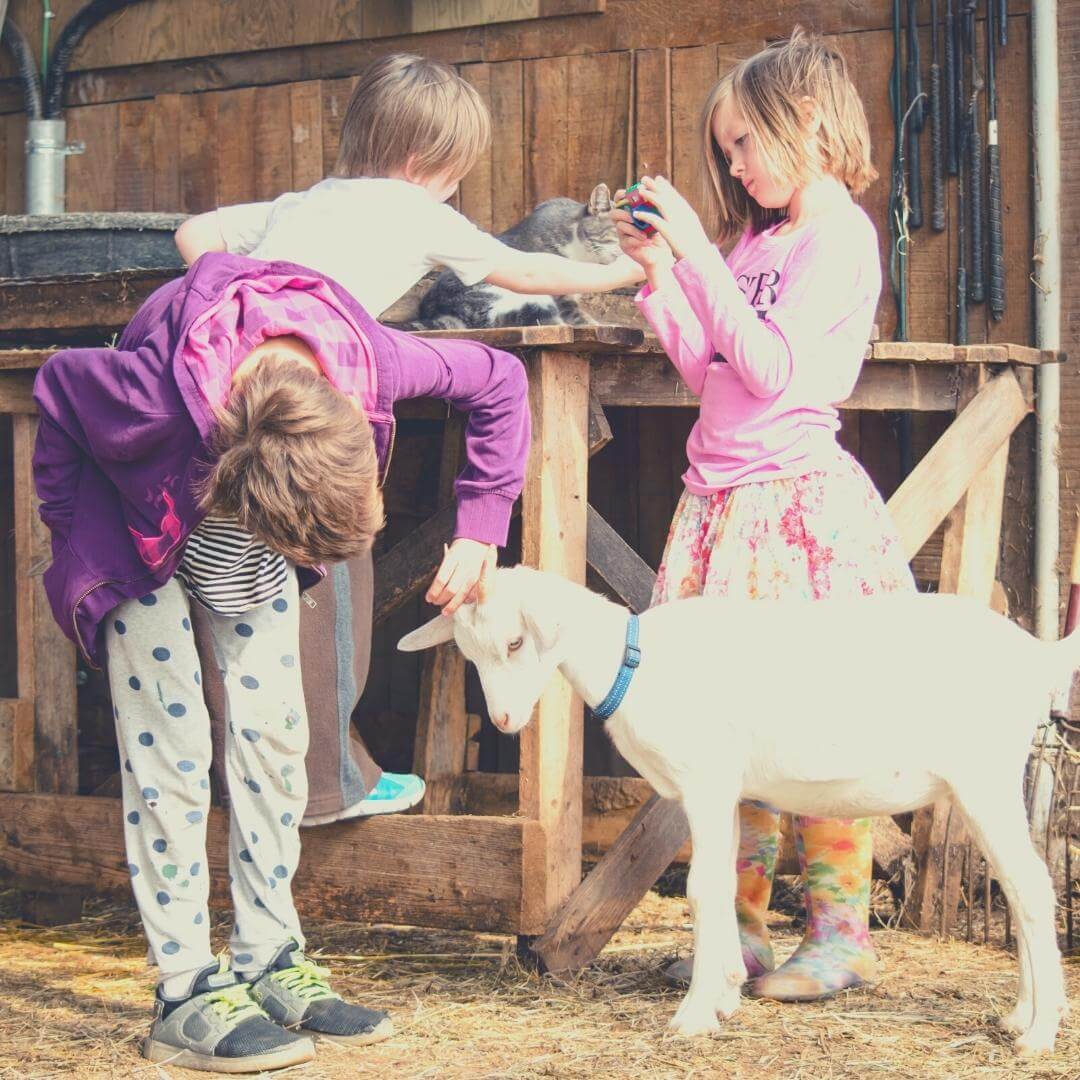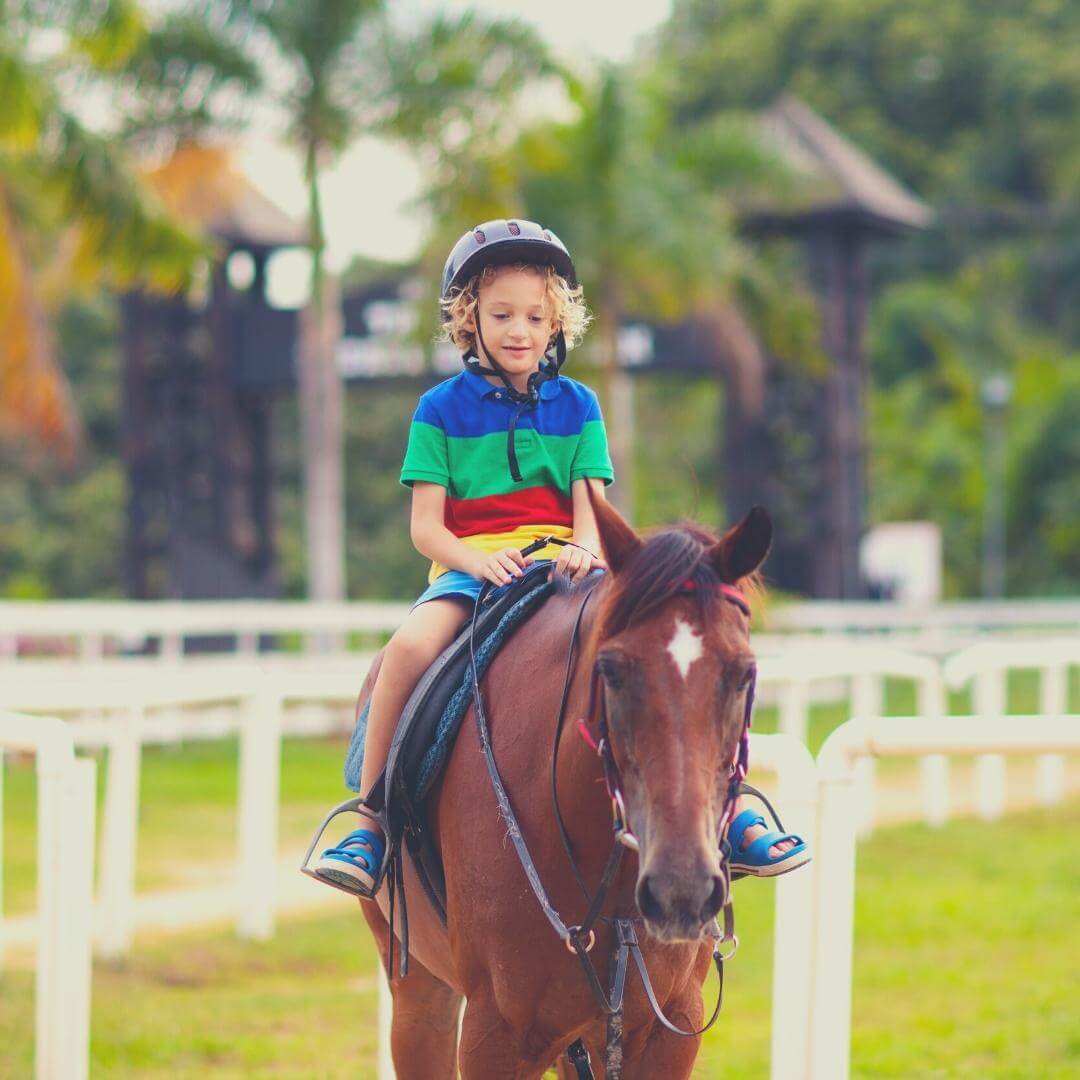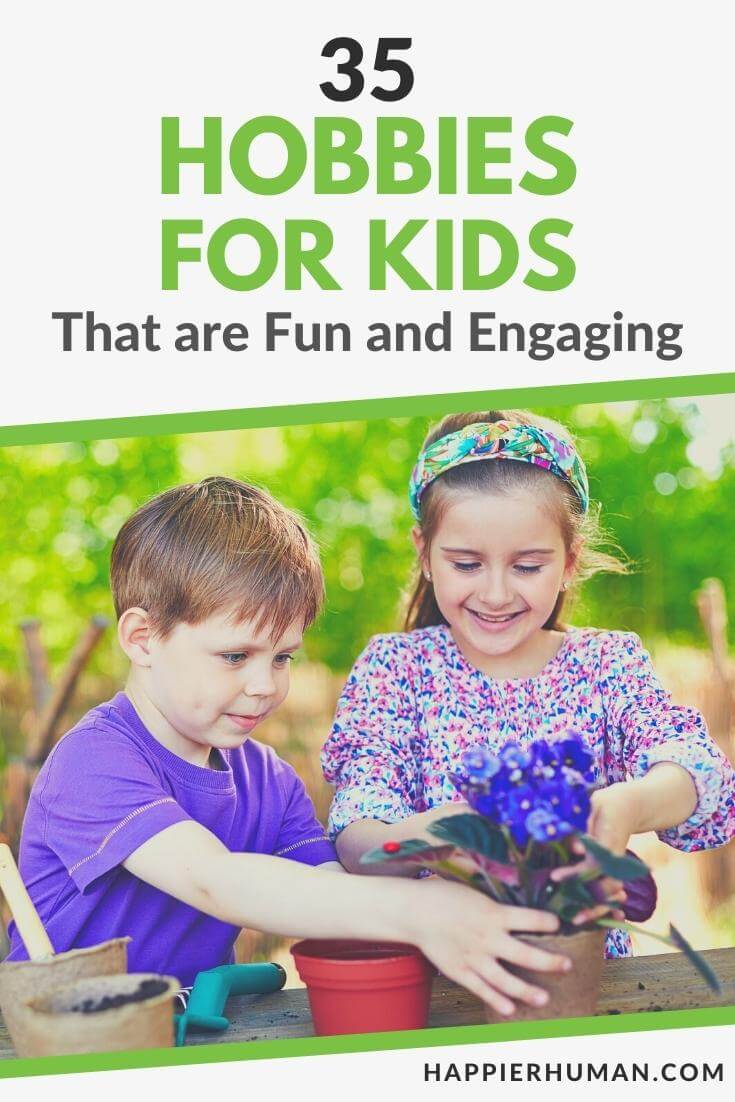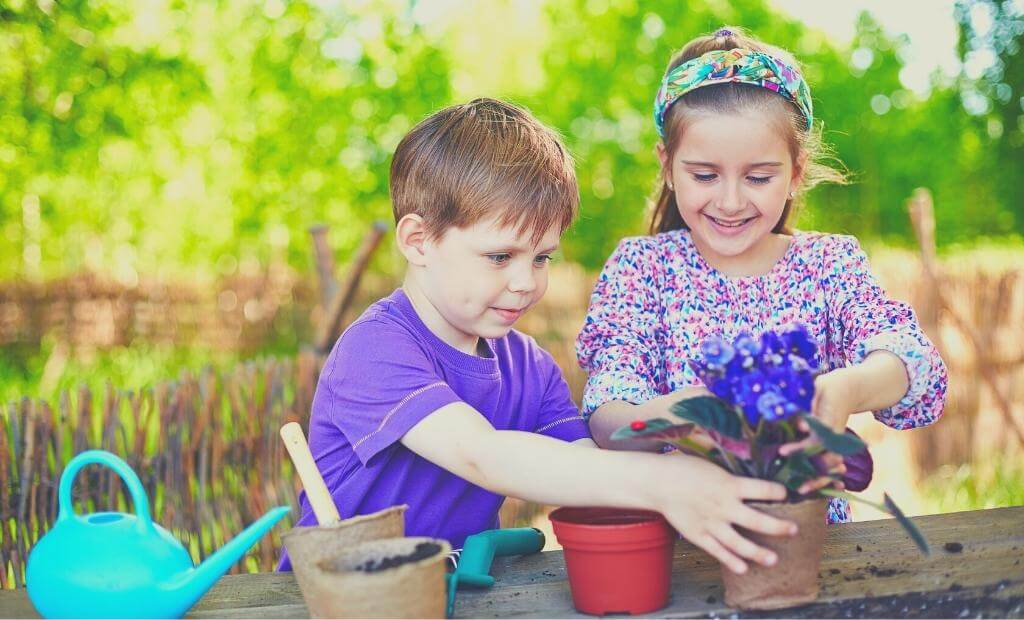“All work and no play makes Jack a dull boy.” ~ Source Unknown
Although I’d be lying if I said I didn’t picture Jack Nicholson in The Shining every time I hear this phrase. Classic.
When I think about hobbies for kids, I remember picking flowers and leaves and collecting stones and other interesting objects around the house and garden when I played make-believe. I remember the art and piano classes I attended. And then there was hockey practice, watching TV, throwing a ball with my mom, and cycling.
Do kids these days even still have hobbies? Do they mostly focus on school work and studying for tests and exams? Or are they glued to their screen?
A recent study by the Kaiser Family Foundation, kids that are ages 8 to 18 spend an average of 7.5 hours in front of screens every day. That adds up to 114 days a year – a third of a year that isn’t spent on school work, quality time with friends and family, or enjoying a hobby or two.
Kids should participate in hobbies that are engaging and fun to experience a balanced life. Plus, it helps set them up for success too.
But what hobbies are beneficial for kids? I will share all of that and more in this comprehensive guide.
What Are Hobbies and Why Are They Important?
A hobby, also called a pastime, is a leisure activity. It’s something you do for fun, pleasure, enjoyment, amusement, relaxation, or entertainment in your spare time. In general, people have at least one hobby they do when they aren’t working or doing normal and boring everyday stuff.
When you have a hobby, you can either practice a particular talent you have or learn something new. In essence, though, you acquire skills and knowledge when you pursue a hobby.
Hobbies, which seem to follow societal trends, fall in one of three categories:
- Casual hobbies: these are a short-lived activity you indulge in because it’s intrinsically rewarding and needs little to no preparation
- Serious hobbies: there are a systematic pursuit – a rewarding activity that’s done regularly and brings the hobbyist a sense of accomplishment
- Project-based hobbies: these hobbies are usually one-off and short-term enjoyable activities (or projects), such as redecorating a room in your house.
No matter what kind of hobby you engage in, it should be something you love and are passionate about.
Having hobbies are beneficial for numerous reasons. They:
- Help you disconnect from the mundane and every day (school and homework)
- Let you hone a skill
- Impart knowledge, and you learn more as you practice more
- Improve your physical health, which betters longevity and decreases your chances of severe diseases
- Give you an opportunity to socialize with other people
- Give you a mental escape
- Lower stress
- Make you happy as you feel like you have a purpose and sense of meaning in life
- Improves work (or school) performance and your problem-solving skills
- Make you an interesting and better-rounded person as you can share stories and impart specialized knowledge
- Teach you to be patient
- Improve your confidence and self-esteem
- Decrease boredom and prevent bad habits
- Enrich your life as you gain different perspectives on things
- Challenge you, which is essential for personal growth
Why Are Hobbies So Important for Kids?
Apart from all the general benefits a child can gain from engaging in fun hobbies, there are also kid-specific reasons why children should have hobbies. Hobbies are important for kids because:
- They Foster a Deep Appreciation for Life
A study published in the Society of Behavioral Medicine found that having hobbies results in fewer negative emotions and less stress. When we are happier overall, we have the opportunity to gain a deep appreciation for life.
You have something to share with others, and practicing something you are passionate about makes you and life that much more interesting.
Having a hobby sets your children up for success. Not every kid who’s passionate about their interests will have a successful start-up one day. But the possibility is there.
Look at the creators behind Tesla, Facebook, Apple, and Microsoft (to name a few). These successful companies are all brainchildren of people who pursued their passions.
By engaging in hobbies, your kid has a chance to explore – life, their world, and themselves. They learn what they like and what they don’t; they’re able to identify their weaknesses and strengths. Essentially, hobbies diversify their interests.
When children practice hobbies from a young age, they acquire essential life skills like critical thinking, time management, cooperation, and having patience, dedication, and willpower. These skills assist children in coping with everyday situations, and they can use the skills learned now in the future too.
Some hobbies can be done solo, which is a great way to stress the importance of making time for themselves. “Me time” allows them to fully immerse themselves in something they are passionate about. However, there are hobbies that you do in a group – like attending an art class.
During these social situations, a child gets to explore their interests while connecting with like-minded people, which also builds their confidence. But the development of social skills goes further – when your kid shares their experiences with friends or family members, they deepen bonds in their social circle.
Your child can also list their hobbies and achievements on their college applications. And depending on what their hobbies are and what career they pursue, they can add these to their résumé one day.
35 Hobbies for Kids
There’s something wonderfully therapeutic about having a hobby you enjoy. And considering all the benefits kids stand to gain from having a pastime, finding a hobby or two is a non-negotiable.
Here are the best fun and engaging hobbies for kids:
1. Arts and Crafts
Arts and crafts cover a wide range of hobbies, from felting and origami to crocheting and diamond painting. It’s also a popular activity for kids to engage in – they’ll never get bored because there is so much in this artsy sphere you can do and create.
Doing arts and crafts also comes with a host of benefits: it relieves stress, increases empathy, boosts your confidence, and manages your feelings and self-expression.
Check out Pinterest or Instagram for inspiration, and watch YouTube videos for the how-to, and check out blog articles for step-by-step instructions.
2. Gardening
Gardening is an excellent hobby for kids. They can learn all about plants, trees, and flowers… and you can even start your own herb garden or organic fruit and veggie garden to teach your child about sustainability and the sensible use of natural resources.
This hobby teaches a kid new skills – watering, fertilizing, plant pests and disease management and control, digging, potting, transplanting, propagation, composting, and more. They also learn about the cycle of life of plants, different soil types, and the benefits of pollinators, worms, and other insects.
Working in dirt and walking barefoot across grass promotes mindfulness and physical activity. Gardening is like an all-in-one beneficial hobby.
3. Caring for Animals
For a real feel-good hobby, why not encourage your child to spend time with animals? Animals are ideal for helping your child bond and experience life and living. The benefit of caring for animals is that your child can learn responsibility for something that’s dependent on them.

As a bonus, your child will develop empathy and kindness, both of which are in short supply these days. Let your child learn about animals, spend time with them, and learn to let go a little more since your child happily engages in healthy activities and learn about animals too.
4. Volunteering
There’s a lot to be said for volunteering to improve your empathy and build strength of character. As a bonus, volunteering will put your child in contact with other children and teach them to play nicely with others.
Empathy is a great side effect, and a welcome one. By volunteering, your child will also be improving their education and learn to prove themselves in their interactions with others.
Consider projects like helping out NGOs that run soup kitchens, shelters, and animal welfare sites. You could also volunteer with your child, building a better bond with them. There are amazing volunteer opportunities in the U.S.
5. Photography
With photography as a hobby, your child can be as creative as they like and capture everything that catches their attention. Consider signing up your child for a photography course on Udemy or Skillshare. They can also play around with the camera features on their own and start self-learning that way.
You’ll need to invest in a good-quality camera for your child, or they can use their phone to capture scenes and objects too. Another alternative is an Instax Mini camera that produces instant credit card size photos.
6. Cooking and Baking
When I watch Masterchef Junior, I’m amazed at the baking and cooking skills young kids have. And getting your child to help you out in the kitchen or have fun by themselves when they are old enough is a wonderful hobby.
Young children may have trouble reaching the kitchen counter, so make your kitchen child-friendly or consider building a play and functional kitchen for a toddler.
When they start baking or cooking, let your child practice their skills with kid-friendly meal recipes or baking recipes for kids. You can get recipes online or buy a kid’s recipe book. Your child can also opt to get a kids’ cooking subscription box or join online cooking or baking classes (like Real Food 4 Kids or Tiny Chefs). They can also learn from you!
Cooking and baking let your young one exercise their creative skills, teach them basic life skills, and enhance analytical skills.
7. Yoga
Yoga is great for kids and adults. It improves your physical fitness, strengthens muscles, and helps you destress. It also encourages meditation and mindfulness, skills that will help your child as they grow up.
This activity is great for children because it doesn’t involve that competitive component of many other sports.
Sign your child up for kid yoga classes, have them follow along to Cosmic Kids yoga videos, put up a poster, or download the Yoga for Kids app.
8. Astronomy
Many kids love gazing up at the sky and seeing the star-filled night sky. Capitalize on that and try to light the astronomy spark.
Visit your local planetarium, invest in a decent quality telescope, and let your kid learn all about celestial bodies like the planets, comets, stars, and galaxies.
Buy your child some books on astronomy, use online astronomy resources to find lessons, videos, games, stories, and more, or download some apps like Stars and Planets, Cosmic-Watch, and Audio Sky Tours – Astronomy.
Astronomy encourages your child’s natural sense of wonder and curiosity.
9. Puzzles
Building puzzles comes with loads of benefits like improving problem-solving skills, hand-eye coordination, and abstract thinking. A challenge is good and can be fun, which boosts your kid’s mood.
There are various types of puzzles your kids can try out to see what they enjoy:
10. Martial Arts
You may want to sign your child up for martial arts, so they can learn self-defense tactics, they aren’t into team sports, or they have a lot of energy to burn.
Martial arts will also boost your kid’s self-confidence, improve their physical health, and promote individual growth as your young one learns about discipline, self-control, focus, respect, and setting goals.
Many options in the martial arts exist:
Take your kid to martial arts classes so they can learn from a trained and professional instructor.
11. Playing an Instrument
Research has found that playing an instrument can make you smarter. And as a parent, you want to give your child the best of the best and all the chances to succeed in life. So if your little one shows an affinity toward music and an instrument (or two), see if they would like to play piano, drums, guitar, or the violin.
Playing a musical instrument not only makes you smarter, but it also improves memory, math, reading skills, builds confidence, and increases cognitive function. Your child also learns about dedication, focus, and discipline when they learn to play an instrument.
12. Calligraphy
There’s something really calming about watching videos of people who write in calligraphy and share their skills. I can only imagine how much fun it’ll be to practice calligraphy, while being creative and mindful.
If your child is passionate about calligraphy, it’ll build confidence, improve concentration, and develop their handwriting and motor skills.
Invest in a book so your child can learn all about this beautiful form of writing or let them watch YouTube videos to teach themselves.
Psst … Check out these cool calligraphy projects your child can engage in!
13. Writing and Journaling
Research has proven that keeping a journal is associated with a positive life outlook and the ability to sleep better and heal more quickly. Starting children young with journaling will help them develop an organized mind and aid in their development.
Children who keep a journal are more likely to logically work out their problems than those who don’t. Writing also affirms your child’s ability to reason and problem solve. Use fun activities to get them started, such as writing a letter, recording important dates.
Start with your child writing a letter. Next, provide them with journaling prompts to help guide them about what they can write. Watch their creativity blossom with each moment being different from the last.
14. Nature Watching
Like people watching, nature watching is just as much fun (if not more so). I like to watch nature – we go hiking at the same venue once a week and I love seeing the new flowers, how nature changes with the seasons, and the insects and animals.
You can encourage your child to watch nature too when you travel, visit national parks, hike, or even take a walk around your neighborhood. Let them enjoy the change of color in the sky and their surroundings during sunset and sunrise, see wildlife, and gaze in awe at the magnificence that is Mother Nature.
15. Dancing
Get your child active and doing what their young bodies like best – dancing. Dance classes cater to all ages, and your child will love learning new dance choreography like hip-hop dance and more.
As a bonus, dance as a hobby also improves your child’s posture, counters “desk-back,” and improves their overall health. If you’re not much of a dancer, you can always enroll your child in a school of dance where they can attend professional lessons and receive parent-child attention.

You can also consider joining the fun with beginner’s mixed dance sessions that cater to both kids and adults.
The final benefit of dancing as a hobby is that your child will develop a healthy body image. All this from moving and twirling.
16. Comic Books and Graphic Novels
“Traditional books” aren’t for everyone, and it’s no surprise that some kids are passionate about comic books and/or graphic novels.
While the young ones enjoy reading comic books and immersing themselves in the comic superhero, anime, and manga worlds, children can also collect comic books, which – in itself – becomes an almost entirely different hobby.
When your child reads comic books and graphic novels, they improve their reading and vocabulary skills, and it increases their thinking and creative skills too.
Buy your child a few comic books to see if they are interested in this hobby, or get them hooked on webcomics.
17. Collections
Collections are a popular hobby, and there are so many things your child can collect:
When your child is into collecting for a hobby, they’ll learn about the history of the items, they’ll acquire an eye to notice distinct features, and they’ll learn to be responsible. Collecting items also boosts their self-esteem and creativity.
18. Video Games
If your child is into video games, you may be worried that they’ll spend too much time glued to their PC or TV screen. That is true, but there are benefits to video gaming as a hobby. It stimulates creativity, helps your child focus, improve problem-solving skills and brain plasticity, and works on hand-eye coordination and reflexes.
There is a wide range of video games and genres your child can get into:
It’s key to ensure the games they are playing are suitable for their age. And you can play alongside your child too!
19. Reading
While many children don’t like to read, it can be a really amazing hobby to follow. Encourage your child to read as often as possible. Reading helps organize the mind and opens the possibilities of who you are and where you are heading.
Whether you see reading as a means to pass time or learn interesting things, opening a book also opens the mind. When reading, your child can pick genres they are interested in. Reading about things they are interested in helps them develop a fondness for learning.
Consider gift vouchers for birthday presents, membership to online readers, public libraries, and even thrift stores as a way to grow your child’s collection of stories and books.
20. Skateboarding
Skateboarding is a cool hobby to have, and it doesn’t hurt that it comes with numerous benefits like improving coordination, balance, flexibility, reflexes, patience, and precision. Plus, it’s a great stress-buster as your child skateboards and breathes in the fresh air.
The good news is that you can teach your kid to skateboard in a day or so (and you can learn too!). When they improve their skateboarding skills, there are various tricks they can try out.
21. Cycling
When your little ones cycle, it increases their mental and physical health. Cycling can be a fun activity your child does around the yard (if it’s big enough), the neighborhood or park (if safe for them to go alone; otherwise, you need to supervise), or during camping trips.
You can also make it a family outing every now and again, so you can spend quality time together and share experiences. Your child can cycle for fun or join competitions.
Various cycling hobbies include:
First and foremost, your kid needs to learn how to ride a bike, and from there, they can try out different cycling disciplines. They can even join a local club to ride and socialize with other cyclists.
22. Sketching and Drawing
For advanced development of hand-eye coordination and great fun, your child could take up the hobby of drawing and sketching. Whether they start small with easy online lessons or even attend a real-life art class, your child will improve their depth perception, fine motor skills, and creativity.
You can also start your child small at home with a drawing area in your home. Spread out a drop-cloth or some old newspapers, place paper over this, spread out some great colored crayons, and have fun.
Don’t forget to help your child focus on how to hold a pen and pencil correctly. Young children are often intimidated by the thought that they have to draw a huge picture, but with support, your child will happily thrive as a creative soul.
23. Puppetry
Puppetry comes with a wide range of benefits:
You can buy your child some puppets and a theater, or make an arts and crafts project and let your child design and make their own puppets and build a puppet theater. They can even do performances for you, family, and friends.
24. Coding
A relatively new hobby on the block is coding. Any child that’s 5 or older can learn to code, and if your kid is really smart, you can see if they understand the coding concepts at an even earlier age.
Learning to code improves your child’s writing and mathematical skills, and this hobby sets them up for success if they want to pursue a career in information technology in the future.
There are various apps, online resources, and games to get your child started with coding. Consider Code.org, Scratch Junior (5-7 year olds), Scratch (8+), Khan Academy, and Code Karts. Eventually, your child will be able to code their own app, website, or computer program.
25. Magic
Make the impossible possible. That’s what magic tricks teach kids; plus, it helps them think outside the box, improve their reflexes and motor skills, and boosts their self-confidence and self-esteem.
With online resources like blogs and YouTube videos, your child can learn to perform magic tricks and work on their stage persona.
26. Flower Pressing and Botany
Flower pressing and learning about plants encourages your child’s sense of wonder, brings out their inner scientist, teaches them about changes in nature, and fosters creativity.
This is an inexpensive hobby. Your kid simply needs a flower pressing kit, or they can dry leaves and flower petals between pages of a heavy book or water-absorbent sheets.
There are a variety of crafts your child can engage in with their pressed flowers and other botanical material:
27. Performing and Playwriting
Typically, if your child has a drama streak, they’ll probably love acting and performing. But even if your kid is more introverted, they can find solace and a passion for the performing arts – whether it is on stage or off stage. Think playwriting, choreography, or directing.
See if your little one likes performing by encouraging them to put up a show for you or your whole family during the holidays. They can get their cousins or other family members involved too.
28. Bushcraft and Survival Tactics
Bushcraft and survival tactics may sound like they are one and the same. While some aspects may overlap, these two hobbies are different. Bushcraft is when your child learns how to use nature to sustain themselves, while learning about survival tactics helps your kid keep themselves alive and safe in unexpected emergency situations.
Your little one may choose any one of these as a hobby, and they may even combine both.
The benefits of these hobbies include that it builds character, improves problem-solving, nourishes your child’s sense of adventure, wonder, and curiosity, provides a new perspective, and offers an expansive sensory experience.
Sign your child up for a course (in-person or online), read articles and books on these topics, watch YouTube videos, and get your kid out in nature so they can practice what they’ve learned.
29. Geocaching
Geocaching is like treasure hunting but using 21st century tools – aka smartphones. This high-tech treasure hunting adventure requires an app that your child uses to find hidden caches – on trials or in your neighborhood. The caches (or treasures) are camouflaged containers that blend into the surroundings, making it more challenging and rewarding to find these.
A cache can be trinkets your kid can trade or a logbook they need to sign.
When your child gets really good at finding geocaches, they can also create and hide caches for other adventurers to find.
Check out Geocaching.com for more information and to get started.
30. Horseback Riding
For the child who’s up for adventure and enjoys speed and beautiful scenery, horseback riding is an ideal hobby. It’s also a hobby you can pursue with them if you ride or enjoy being out in nature.
Riding lessons are a must – and I don’t mean “the get on and slap the rump” kind of lessons. Ensure your child wears correct safety gear to protect them if they should fall.

Horseback riding improves coordination, dexterity in the hands and fingers, plus looking after horses helps teach your child a sense of responsibility. They learn about time, medicines, and caring for a horse’s day-to-day needs like feeding and watering, and more.
Your child can also push and compete in riding events like jumping, dressage, and more. Owning a horse is expensive, so consider half-bait or leasing a horse.
31. Archery
Another fun and engaging hobby for kids is archery. Think Robin Hood.
While the recommended age to start with archery is 8, when your kid starts with this hobby all depends on their strength, physical ability, and maturity.
Your little one can watch YouTube videos to see tips and tricks, but in-person lessons are the best way to learn. Archery can be a fun hobby, but your child can also choose to compete as they improve their archery skills.
32. Rock Climbing
Rock climbing is a great sport and hobby. Benefits of this activity include:
Your child can learn rock climbing from an instructor and by watching online videos. They can visit a rock climbing center or a ClimbZone, and later on, advance to rock climbing out in nature.
33. Foraging
A cool hobby your child can get into is foraging, which is increasing in popularity. Foraging is when you go on walks and notice edibles and decorative plants you can use or take home.
When your child learns about foraging, they’ll be able to recognize edible wild foods, weeds, and fruit trees. It’s educational and fun.
This is an important survival skill, and while it can form part of bushcraft, foraging is a hobby in its own right.
To start foraging, check out this foraging for beginners guide.
34. Soap or Candle Making
Your kid may like to make items with their hands and either sell these or give them away as gifts. And homemade soap and candles do make excellent gifts!
Use blogs or YouTube tutorials to learn how to make candles or soaps.
It’s therapeutic to make soaps and candles, and your child can be as creative as they’d like to be.
35. Flying Drones and Model Aircraft
Flying drones or model aircraft is quite an engaging activity. If your child flies a drone, they can also learn about aerial photography.
There are a multitude of benefits when your kids fly drones or aircraft:
Ensure you and your child adhere to any drone and model aircraft rules and regulations.
Final Thoughts on Hobbies for Kids
It’s essential that your kids have at least one hobby they are passionate about. The hobby teaches them so many skills, and it makes them well-rounded adults. Plus, they learn how to balance school work with leisure time.
See what natural talents your child has and encourage hobbies they will excel at. However, it is also good to let your kid explore various hobbies, and even if they don’t have a natural talent, let them enjoy and immerse themselves in the hobby that makes their heart sing.
Want to join in on the hobby fun? Check out our listicles on: 35 solo hobbies, 23 cheap hobbies, or 31 hobbies for introverts.


